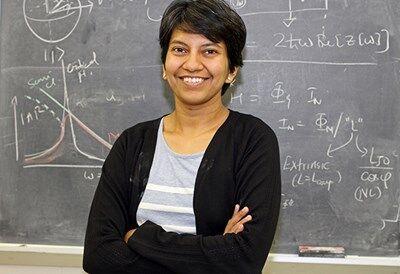Contribute
| UMass Lowell Physics Professor Archana Kamal Wins $1 Million In Research Funding |
Press Release
04/22/2021
An Indian American physics professor and researcher at the University
of Massachusetts at Lowell won a pair of early career development
awards totaling $1 million for her quantum information processing with
open quantum systems research. The university reports that UMass
Lowell’s Archana Kamal won the awards for her research in the emerging
field from the U.S. Air Force and the National Science Foundation. Quantum
information processing is based on the principles of quantum mechanics,
which mathematically describe the behavior and interaction of matter
and light on the atomic and subatomic scale, the press release notes. While computers encode data in the form of binary digits, or “bits,â€
which are a series of zeros and ones, quantum computers convert
information into quantum bits, or “qubits.†A qubit, which is the basic
unit of quantum information, represents a two-state, or two-level,
quantum system, such as the up and down spin of an electron or the
horizontal and vertical polarization of a photon, it said. Scientists
worldwide, including Kamal, are developing next-generation quantum
computing technologies with processors that can solve large, highly
complex problems much faster than existing supercomputers using the
best-known algorithms, the publication notes. This is the reason
why for more than a decade, tech giants like Google, IBM and Microsoft
have been investing heavily in quantum computer hardware research, the
Sun said. The
biggest challenge to realizing usable quantum processors is
“decoherence,†the loss and erasure of quantum information due to strong
interactions between qubits and the uncontrolled, “noisy†environment
around them. This is the central issue that Kamal is addressing in her
research, according to the report. Aside from quantum computing,
Kamal’s projects could lead to advances in quantum information
processing applications and other innovative technologies, including
quantum sensing, quantum communication and quantum cryptography (using
quantum mechanical properties to store and transmit data securely), the
outlet noted in its report. Kamal was recognized by the Air Force
Office of Scientific Research with a Young Investigator Program grant —
worth $450,000 over three years — for her work on tunable quantum
dissipation, which can be used to develop autonomous, quantum
error-correction protocols, it said. Kamal’s five-year NSF CAREER grant totaling more than $557,000 will
support her research into the entanglement dynamics of quantum systems
in the presence of non-trivial noise, the report adds. The awards
are the latest recognition for Kamal’s research. In 2018, she was named
to MIT Technology Review’s prestigious annual list of Innovators Under
35 as a visionary.
You may also access this article through our web-site http://www.lokvani.com/
